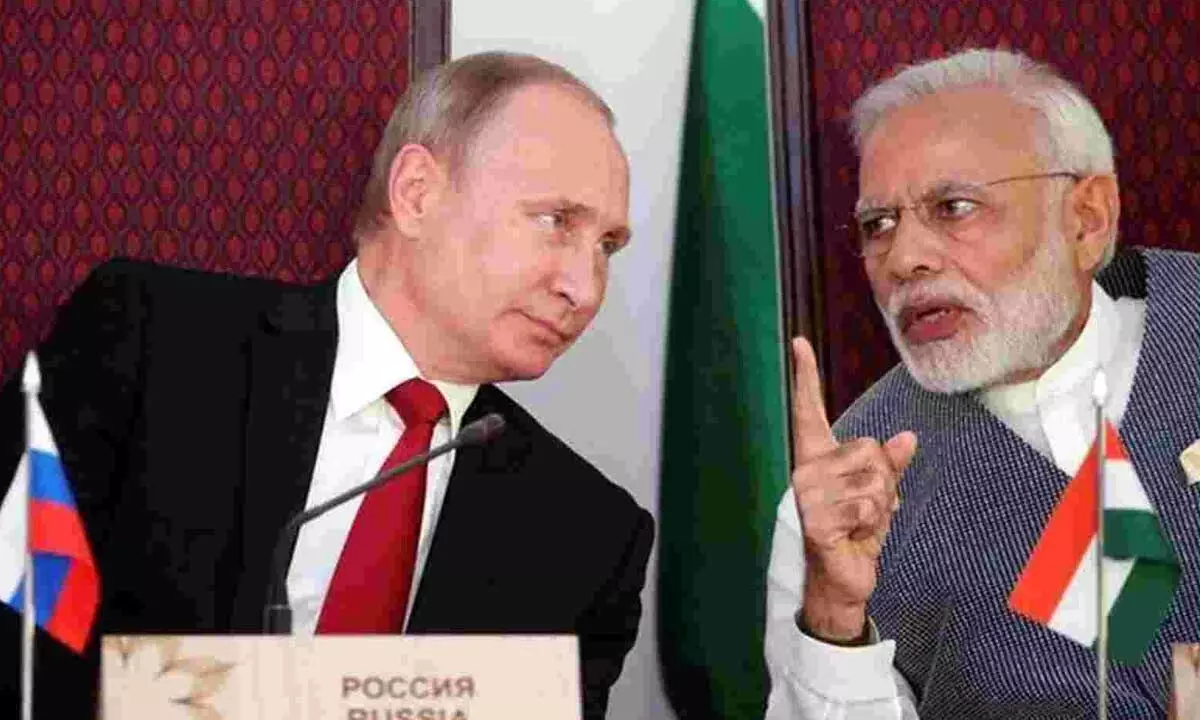Revitalised Indo-Russian economic ties augur well for both nations

Revitalised Indo-Russian economic ties augur well for both nations
Moscow’s proposed cluster investment platform for joint projects will be a good facilitator
At a time when western nations are seeking to isolate Russia by imposing economic sanctions, India has resumed talks to enter into a free trade agreement with that country. The development indicates that India will not deviate from its independent foreign policy and continue to deepen its traditional close ties with Russia, despite the conflict in Ukraine. In fact, bilateral trade flows have risen sharply ever since the war began largely because of the expanding share of crude oil in the import basket. The two-way trade has now crossed 45 billion dollars and gone beyond the target of 30 billion dollars aimed at originally for 2025.
The resumption of talks for a free trade pact was disclosed during the recent visit of Russian Deputy Minister Denis Manturov to attend a meeting of the inter-government commission covering the entire gamut of Indo-Russian relations. He noted that the negotiations were with the five-member grouping known as the Eurasian Economic Union (EEU), which includes Russia, Belarus, Kazakhstan, Kyrgyzstan and Armenia.
This little known economic alliance was set up in 2014 in an attempt to provide a free trade area for these countries and also raise the standard of living for those in the region. It so far has remained as a customs union and is yet to graduate to having a common currency like the European Union.
The talks with Russia involving the EEU may take some time to actually materialise into an agreement but other issues relating to bilateral trade will have to be resolved more quickly. This includes the fact that there is a growing trade deficit with Russia, largely owing to the sharp rise in oil purchases.
As far as buying oil from that country is concerned, Union Finance Minister Nirmala Sitharaman has made it clear that India would continue buying oil from the cheapest sources and Russia is offering at discounted prices. But with OPEC having cut production quotas and caused a price spike, it is now evident that purchases of Russian crude may cost more than the 60 dollars per barrel cap imposed by western nations on oil bought from Russia.
It must be noted that the higher purchases of Russian oil over the past year has coincided with the deeper partnership on strategic issues between India and the U.S. These two countries have been collaborating in the Quad grouping with Japan and Australia on a wide gamut of issues, which has included trying to develop a semiconductor supply chain. It is aimed at providing an alternative to the reliance currently on China and Taiwan for semiconductors and their components.
It is these closer ties that have probably enabled the U.S. to take a more nuanced approach to the long standing ties between India and Russia, which have manifested in the lack of any direct condemnation of the Ukraine invasions. There is also recognition that the oil purchases stem purely from national self-interest. With oil prices ruling at around 100 dollars per barrel for most of 2022, the offer of discounted oil from Russia was too good to turn down.
The corollary to that is now the trade deficit. To bridge it, Russia is looking at a wide range of products from India, including road construction materials and equipment, chemicals and pharmaceuticals. These are no longer easy to procure from western countries. It was reported earlier that Russia was considering buying 500 products from India covering a wide range of areas owing to the inability to operate its industries in the absence of key components from the west. These include cars, trains and aircraft.
A new scheme of cluster investment platform for joint projects is also said to have been proposed by the Russian authorities to overcome the problem of the skewed trade balance. This envisages soft loans to be provided for development and manufacture of priority products.
The increasing trade between the two countries may now revert to some extent to the old system of using the rupee for bilateral transactions as was done during the Soviet era. The move has been in response to western sanctions against Russia.
It is in this context that the visiting Russian ministers mentioned that the use of national currencies or those of friendly currencies would also be considered while expanding trade ties.
At the same time, it is clear that there are a host of problems in establishing the rupee payment facility. Oil marketing companies importing crude are not keen to transact business in roubles or rupees and would prefer to use the UAE currency, the dirham. Likewise, Russian banks are not keen on holding large quantities of rupees. The modalities for implementing the scheme will thus have to be worked out in a way that is beneficial for both countries.
It cannot be denied that the Ukraine war has actually increased the economic engagement between India and Russia. The earlier deep bilateral investment and trade relationship had become fairly muted over the past few decades. Both countries had strengthened their ties with the west and have not been dependent on each other for a wide range of products, as was the case in the past. As for continued expansion of ties in future, much will depend on the changes in geopolitical scenario especially on the Ukraine conflict.








